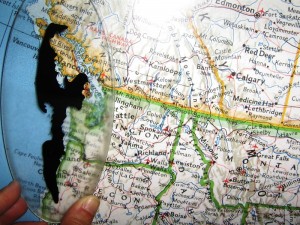— from Janet Alderton, San Juans Alliance —
BACKGROUND INFORMATION
On March 24, 1989, the Exxon Valdez (a 984’ long tanker) struck a reef in Prince William Sound, spilling more than 11 million gallons (about 17 Olympic-sized swimming pools) of crude oil. Despite containment efforts, the oil coated 1,300 miles of coastline (over 3 times of all combined coastlines in San Juan County), and covered an area about 25 times the area of SJC waters. 25 years later, an estimated 20,000 gallons of Valdez crude oil is still in Alaska’s sand and soil. The tragic ripples of ecological and economic devastation are still being felt today; several marine species and commercial fishing are still recovering or have yet to recover from the spill.
Could a spill the size of the Exxon Valdez happen here? Yes!
The waters surrounding San Juan County could become one of North America’s busiest fossil fuel trans-shipment corridors. In 2010 there were 10,000 deep draft vessel transits through the Strait of Juan de Fuca. With new and expanded projects in Canada and Washington, 2,620 additional deep draft vessel transits are proposed per year. This unprecedented level of additional vessel traffic, primarily fossil fuel transports, significantly increases the risks of a major oil spill. A single spill from the larger tankers and cargo ships these proposed projects will use could have a greater devastating impact than the Exxon Valdez oil spill.
Recent technology has enabled oil extraction from tar sands and shale deposits, opening up vast new reserves from Canada and the US. Ten new proposals have emerged in the last year to ship coal and crude oil by rail and pipeline to both expanding and new Northwest terminal and refinery facilities. Just one proposed project in Canada, Kinder Morgan’s Trans Mountain Pipeline Expansion project, would significantly increase the export of diluted bitumen (aka Canadian Oil Sands or Alberta Tar Sands). Diluted bitumen has significant and unique clean-up challenges and substantial new risks to the health of our environment, economy, and first responders. Tanker vessel traffic would increase from five tankers per month (60 per year) to up to 34 tankers per month, or 408 tankers per year. These 816 annual tanker transits will significantly increase the risk of a major oil spill (both propulsion fuel and the diluted bitumen cargo) in the waters surrounding San Juan County.
These proposed increases in vessel traffic and associated increased risk of a major oil spill raise several questions that need to be answered. Are Washington State and the U.S. Coast Guard prepared to respond to a spill of diluted bitumen? Are there sufficient spill response resources to adequately respond, contain, and clean-up a spill of any of the propulsion fuel and/or cargo oils transported through our waters? In an event of a major oil spill, how will all the private and publically owned shorelines get completely cleaned up? Who will pay for the clean-up and what assurances does the public have that funds are available to cover the full cost of the clean-up and the economic, environmental, and health impacts that would be the result of a major spill?
ATTEND A LECTURE
Our Islands at Risk: Increased Vessel Traffic and Increased Risk of a Major Oil Spill
Learn about what would happen in the event of a major oil spill. Gary Shigenaka, a marine biologist for NOAA, who specializes in marine life studies during oil spills, will talk about how various cargo and propulsion oils would likely behave if spilled in our marine environment. Julie Knight, Executive Director of Islands Oil Spill Association (IOSA), will talk about local spill response preparedness.
- Lopez Island: Friday, March 14, 7:00-8:30 pm at Lopez Center
- Orcas Island: Saturday, March 15, 12:30-2:30 pm at Orcas Episcopal Church
- San Juan Island: Sunday, March 16, 12:30-2:30 pm at the San Juan Island Grange
WATCH A MOVIE
Black Wave: The Legacy of the Exxon Valdez
Screenings of this award-winning documentary about the Exxon Valdez oil spill:
- San Juan Island: Friday Harbor Film Festival’s screening is on Tuesday, March 18, 7:00 pm at the San Juan Island Grange. Admission is by donation.
- Orcas Island: San Juans Alliance is sponsoring a free screening on Sunday, March 23, 3:00 pm at the Orcas Senior Center.
- Lopez Island: San Juans Alliance and Lopez Library is co-sponsoring a free screening on Monday, March 24, 7:00 pm at the Lopez Library.
LOOK FOR DRIFT CARDS
Drift card drops co-sponsored by FRIENDS of the San Juans, Georgia Straits Alliance and the Raincoast Conservation Foundation
On March 24th, the 25th anniversary of the Exxon Valdez oil spill, a drift card drop will simulate what would happen if a spill occurred in Turn Point/Arachne Reef in Boundary Pass and, Bird Rocks in Rosario Strait. People who find drift cards can report the location where they were found at www.salishseaspillmap.org or call 360-378-2319.
FURTHER INFORMATION
Exxon Valdez Oil Spill:
https://www.evostc.state.ak.us/index.cfm?FA=facts.QA
https://www.evostc.state.ak.us/static/PDFs/2010IRSUpdate.pdf
https://www.afsc.noaa.gov/Quarterly/jas2001/feature_jas01.htm
https://en.wikipedia.org/wiki/Exxon_Valdez_oil_spill
OIL SPILLS – GENERAL:
https://en.wikipedia.org/wiki/List_of_oil_spills
Kinder Morgan Trans Mountain Pipeline Expansion Project Application:
https://application.transmountain.com/facilities-application
See volume 8 on marine transportation:
https://transmountain.s3.amazonaws.com/application/V8A_1_of_4_1_TO_4.2.9_MAR_TRANS_ASSESS.pdf
https://transmountain.s3.amazonaws.com/application/V8A_2_of_4_4.2.9.1_TO_4.6_MAR_TRANS_ASSESS.pdf
And especially section 5 of volume 8 on risk assessment and spill management:
https://transmountain.s3.amazonaws.com/application/V8A_3_of_4_5_TO_8_MAR_TRANS_ASSESS.pdf
DILUTED BITUMEN:
https://insideclimatenews.org/news/20120626/dilbit-primer-diluted-bitumen-conventional-oil-tar-sands-Alberta-Kalamazoo-Keystone-XL-Enbridge
https://www.ntsb.gov/doclib/reports/2012/par1201.pdf
——–
- Lopez NO COALition, Chom Greacen, 360-468-3189, lopeznocoalition@gmail.com
- Orcas NO COALition, Janet Alderton, 360-376-3905, jmalderton@yahoo.com
- San Juan Islanders for Safe Shipping, Shaun Hubbard, 360-378-3586, shaunalice@comcast.net
- FRIENDS of the San Juans, Stephanie Buffum, 360-378-2319 stephanie@sanjuans.org
**If you are reading theOrcasonian for free, thank your fellow islanders. If you would like to support theOrcasonian CLICK HERE to set your modestly-priced, voluntary subscription. Otherwise, no worries; we’re happy to share with you.**








